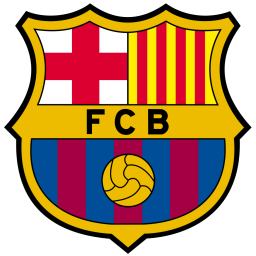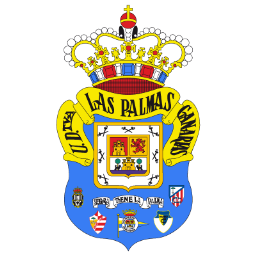analysis | 2015-09-25
How could the Catalan Independence affect FC Barcelona?
On September 27, Catalonia will hold elections to decide the composition of its parliament and the future government of the Generalitat (an institution created in 1359 and the main governing body in Catalonia). But on this occasion, the elections will also attempt to resolve something much more important: finding out the extent to which Catalans are in favor of independence. Given the Spanish government’s refusal to hold an independence referendum like they did last year in Scotland, the calling of regional elections was the Catalan government’s plan B so that they may use the ballot box in an attempt to assess just what it is that Catalans want for their country. Despite officially rejecting the plebiscitary nature of the polls, all of the unionist parties have ended up de facto accepting it, and the discussions surrounding the pros and cons of an independent Catalonia have completely overshadowed the political debate.
At this point, any culé – especially if they are foreign and cannot relate to the political reality in Catalonia and in Spain – will ask themselves: what do these political issues have to do with FC Barcelona’s future? The answer could be found on the front pages of Tuesday’s sporting press, which reveal the declarations of both the president of the Consejo Nacional de Deportes (the highest political authority in Spanish sport) and of La Liga in which they announced that Barcelona (and all other Catalan teams) would be expelled from all Spanish competitions in the event that Catalonia was declared independent, predicting that Barcelona would effectively be reduced to “the standard of Celtic or Ajax” at a European level.
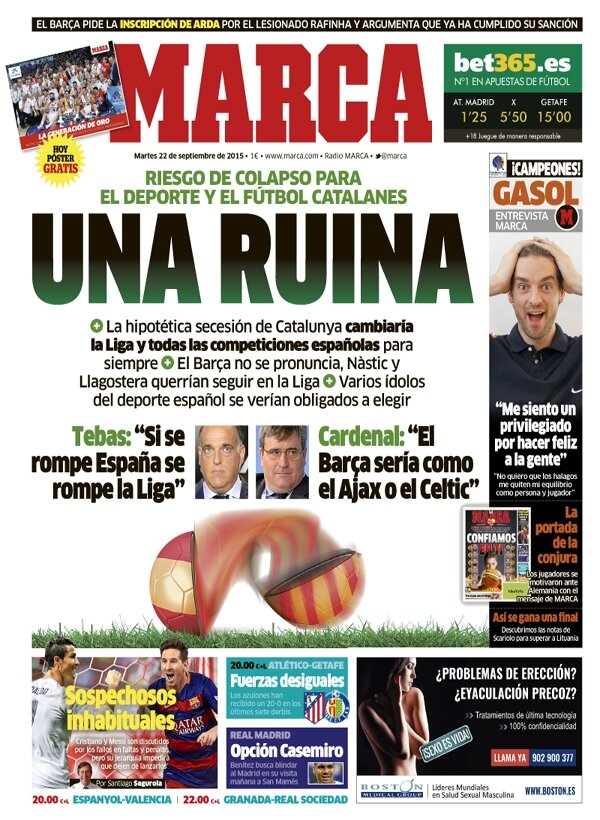
Marca Cover: "IN RUINS: Catalan sports and football on the verge of collapse."

Diario AS Cover: "Cardenal: If Catalonia becomes independent, Barça would end up like Ajax or Celtic."
These statements must be interpreted from a purely political standpoint. Just as happened in Scotland a few days before their independence referendum, it is natural that the established powers that be who, by definition, are against any kind of change which could endanger their privileged position in the current status quo, make declarations with the intention of discouraging those who are tempted to vote in favor of a change as radical as that supposed by a secession. So, in the last few days, various political leaders and personalities, from the world of finance and now from the world of sport, have come forward to warn Catalans just how catastrophic it would be for them to gain independence. The fact that the Mundo Deportivo article which covers these statements has a full-page advertisement from the Sociedad Civil Catalana (a unionist organisation) on the next page with the slogan “I want Barça to continue playing in La Liga, so let us put an end to separatism,” reflects the extent to which sport is being used as a political weapon.
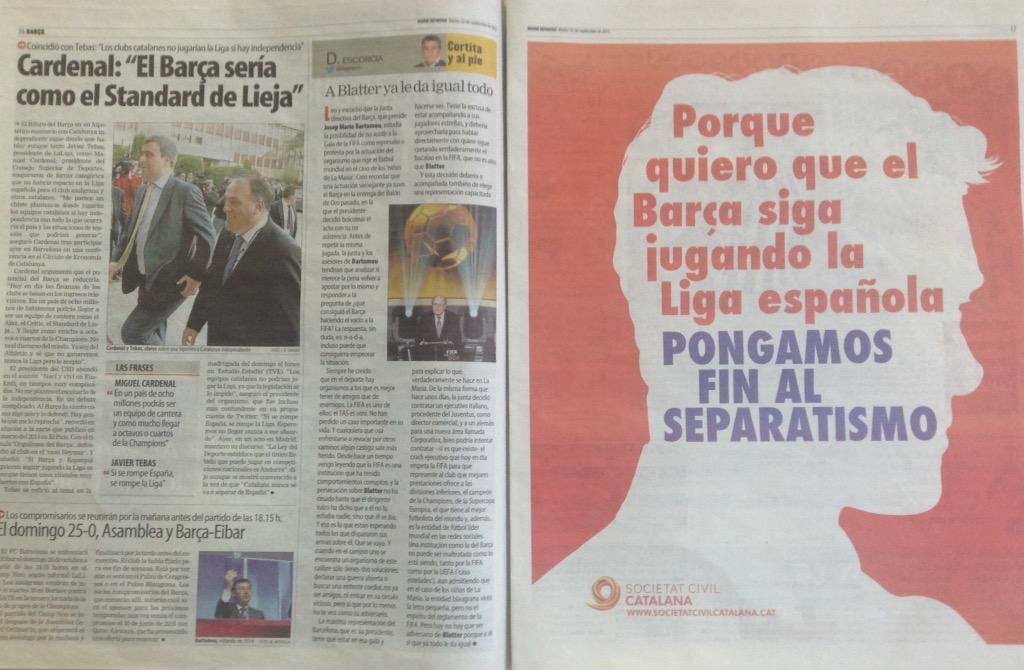
Beyond how senseless it would be for any citizen to decide their vote on a subject as complex and significant as this by basing it on what may or may not happen to their football team, from a purely sporting point of view, it may be interesting to analyze how much truth is in these declarations and what scenarios Barcelona (and all of the other Catalan teams) would face in the event that Catalonia did gain independence.
Current Spanish Sport Law states that only Spanish teams can participate in Spanish competitions, and adds a stipulation that also welcomes teams from Andorra, in the same manner that Welsh teams can compete in the Premier League or Ligue 1 allowing Monaco to compete. In this regard, with current Spanish Law, Barça would not be able to compete in La Liga if Catalonia became independent. But on the other hand, does it not make sense to consider the possibility of modifying said law? Especially when we are talking about a global change of scenery as significant as the creation of a new state? The answer, as is almost always the case in politics, is not in the laws, but in the personal interests of those concerned, which reflect the different possible scenarios.
It is abundantly clear that being excluded from La Liga would endanger the rest of the teams – especially Real Madrid – as well as Barcelona. As a commercial product, La Liga is a competition which is a long way behind the Premier League (with millions watching every week from all over the world), or even the Bundesliga (which has packed stadiums week in, week out), so its international relevance depends largely on the rivalry between Real Madrid and Barça and the audiences generated all over the world every time there is a clásico. Without Barça, interest in La Liga would plummet, and with it, its ability to generate income, which would end up doing a great deal of damage to Spanish clubs’ competitiveness. In this context, does it not seem reasonable that these very clubs would be the ones most eager to modify Sports Law to allow the continued participation of Catalan teams as they have done up until now?
In the event that they did not attempt to do so, or if the political climate did not allow it, Barcelona would have one other option, which is as interesting on a sporting level as it is economical: use its tremendous media pull to attempt to find the spotlight that it could not find in Spain in one of the other major European leagues. In this case, Ligue 1 and the Premier League appear to be the most plausible options. Ligue 1 gains an immediate advantage because of its geographic proximity and the fact that incorporating Barcelona would represent a huge boost for a league which simply cannot compete with the Spanish, German or English leagues. Obviously, the inclusion of Barcelona would make it more difficult for the other French teams to compete for titles, but, on a global scale, the competition would benefit from having a team capable of competing head-to-head with PSG and putting an end to the threat of the league becoming a boring Parisian monologue season after season. As for the Premier League, adding a heavyweight of Barcelona’s caliber to a league which already counts on the likes of Manchester United, Manchester City, Chelsea, Arsenal and Liverpool, to name a few, would mean that the Premier League, which is already the most watched league in the world, could end up becoming an all-encompassing media behemoth, similar to what the NBA is in basketball. Only the creation of a European Super League outside of UEFA, which would unite each country’s strongest teams, would exceed the appeal of a Premier League with Barcelona in it. This scenario also has the advantage of not being unheard of on English shores, where you can already find Catalan and French rugby teams competing in the local league.
The scenario predicted by recent headlines in the sporting press would only be confirmed if none of the aforementioned options came to fruition. Resigned to competing in a league as small as a Catalan league, Barcelona’s income would drop dramatically, meaning that they would be unable to hold on to their best players and would become reduced to a European lightweight more akin to Ajax or Celtic. As for the rest of the clubs in Spain, their incomes would fall too, as would their sporting capabilities, meaning that La Liga would lose its status as the strongest competition in Europe as demonstrated by its clubs' results in Europe.
Whether we end up in this scenario where everyone is a loser, or on the contrary, the mutual interests of a select few are served, nobody can really say for sure. Only time and the result of the Catalan’s vote will prove who is right and who is wrong.
Anything wrong? .



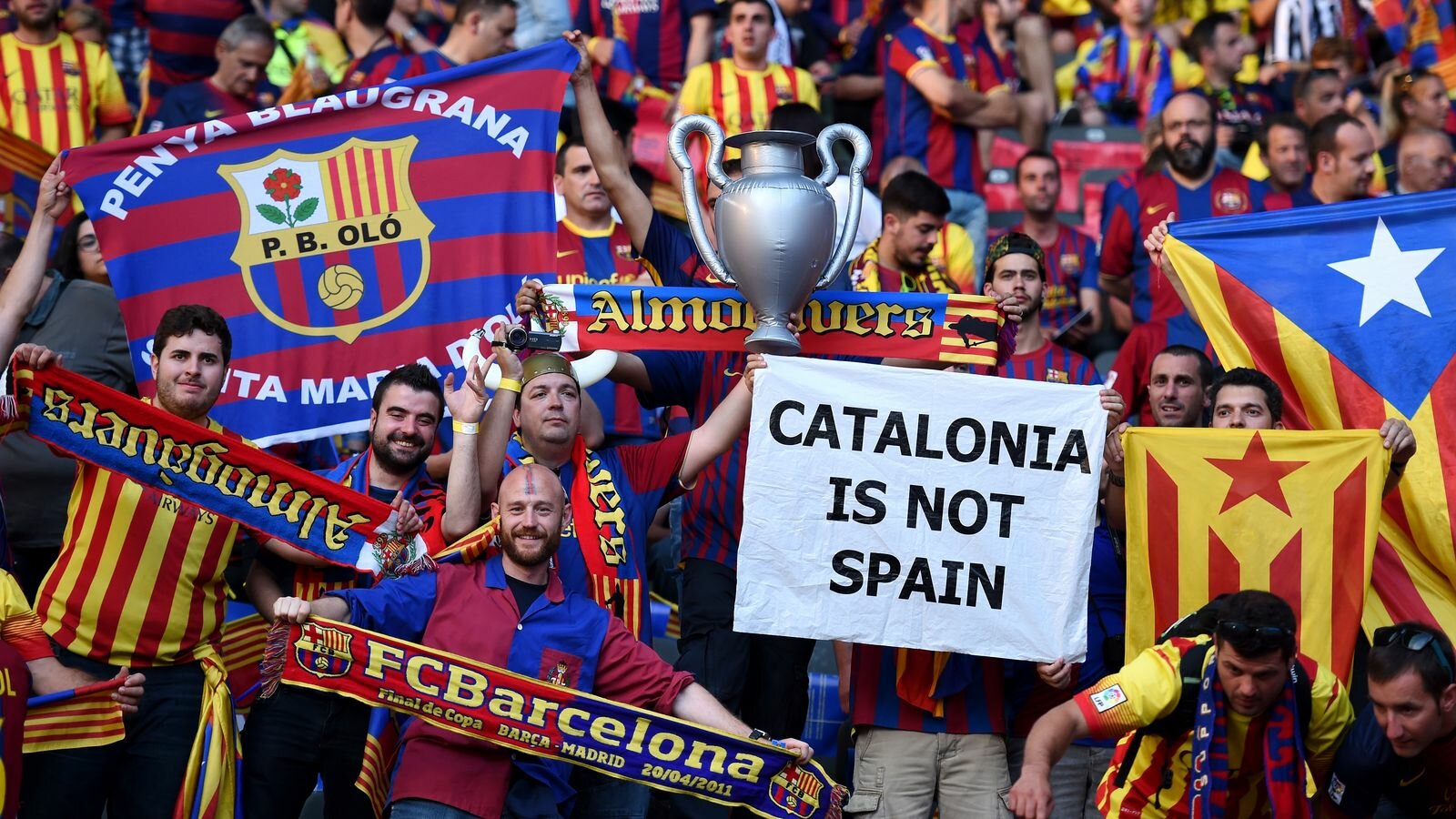
 Barcelona News 24/7
Barcelona News 24/7

